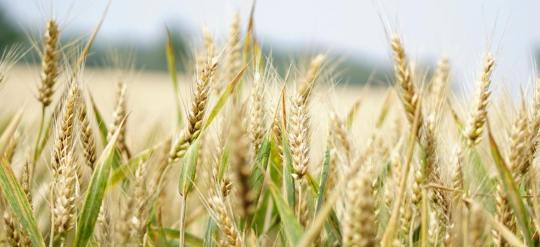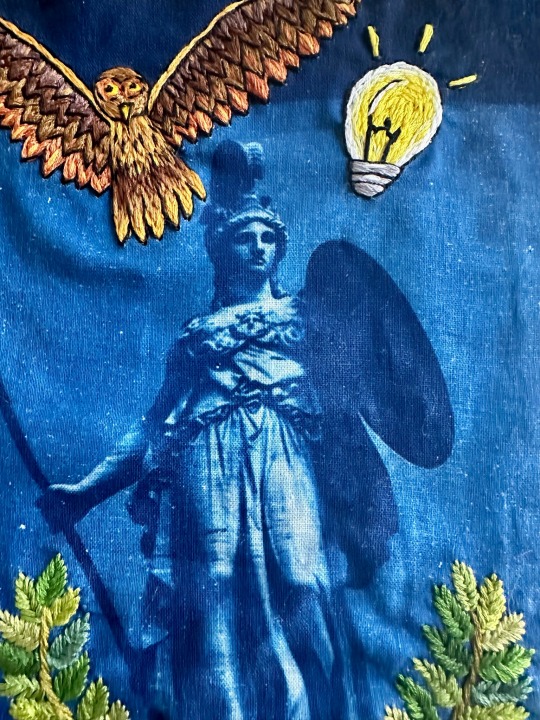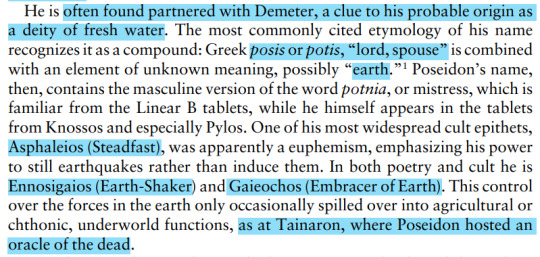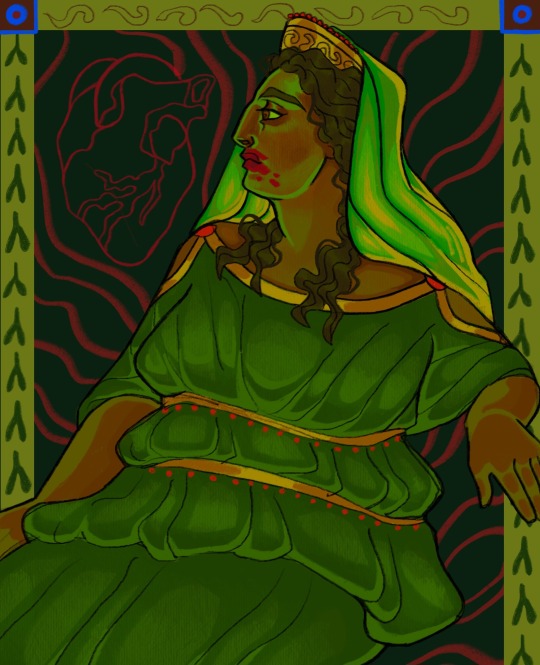Palestinian-Mexican. Follows from artsymoth. Talk to me I don't bite.
Last active 60 minutes ago
Don't wanna be here? Send us removal request.
Text
Charis is difficult to translate, because it is (at least) two-sided. On the one hand it expresses the feeling of gratitude felt by humans to the gods for giving them good things, and on the other it means that ‘‘grace’’ or ‘‘bounty’’ which the gods give men. And the word is related to chairō, Greek for ‘‘feel joy or happiness.’’ In worship the Greeks aimed at generating an atmosphere of reciprocal charis; they would express their grateful worship of the splendid gods; the gods, in turn, would – hopefully – grant them their charis, goodwill, which translated into wealth, health, and power. We can see how hymn-singing is part of the human ‘‘charis-drive’’; it is an aesthetic offering to go with other material offerings (animal sacrifice, libations, incense, etc.) designed to secure divine goodwill. Prayer, on the other hand, is a request put to god(s) backed up by references to other acts of worship (sacrifice etc.) which might induce the god(s) to grant the request. The prayer-request itself is not conceived as an offering, either material or aesthetic.
Prayers and Hymns by William D. Furley, in A Companion To Greek Religion edited by Daniel Ogden
113 notes
·
View notes
Text
Offering ideas for special events
That’s a topic I haven’t seen much posts about. Most likely because a lot of people, myself included, prefer to show that offerings can be quick and simple and on the cheaper side for accessibility. This post is meant for those occasions where you want to do something special, whether it is for a special event, an ex-voto or a celebration of some kind.
Holding a feast is one of the easiest grand gestures to pull off, especially if you’re already holding a party. Extras can include things like using ingredients, foods or drinks that are sacred to the deities you are honoring.
Without going as far as holding a full feast, preparing baked goods or drinks specific to a deity can already be considered a special kind of offering.
Devotional arts and crafts. The concentration, time, work and ressources put into a devotional piece are all things that are dedicated to the deity you chose to do it for.
Dedicating things of value, sentimental or monetary.
Who to pray to for specific life events?
Birthdays: Personal birthdays weren’t really a thing historically for the ancient Greeks, so there are no traditional associations so to say. That being said, on a modern standpoint, I think fate and household divinities would fit nicely. Agathos Daimon, Tyche, Zeus or the Moirai come to mind.
Weddings: Zeus and Hera especially alongside Aphrodite and Artemis. One can also consider Persephone.
Graduations: Athena comes to mind, but also look who the patron of your field is. (eg: Asklepios for the medical field, Hermes for trade etc…)
Pregnancy/birth of a child: Hera, Artemis, Apollo. Persephone and Leto are possibilities as well.
This is definitely not an extensive list but a good place to start.
296 notes
·
View notes
Text
Honoring the Spirits of Home: Creating Sacred Spaces for the Unseen
Welcome back, Seekers! Within my local coven, we are journeying through the mysteries of Spirit until Winter Solstice. Today, I introduced the art of crafting Spirit Houses, and I thought it would be fitting to share a bit of that here. I like to keep these crafty posts simple and open-ended, leaving space for the practitioner to add their own touch. The best magick often arises from just diving in and letting your intuition guide the way. May this inspire you to connect, create, and explore! 🌙✨
As witches, we work with spirits every day, whether we realize it or not. Our homes, like ourselves, are steeped in the spirit world, alive with layers of unseen inhabitants that have their own roles, wisdom, and stories to tell. For many of us, it’s a quiet understanding that a witch’s home should be haunted—not in the fearful sense, but filled with life that pulses in harmony with our craft. From ancestral guides and house spirits, to the land’s ancient beings, these entities weave themselves into the very fabric of our spaces, enriching them with energy and presence.
Regardless of whether a home is newly built or weathered by decades, each dwelling becomes imbued with spirit. There’s an existing ecosystem of energies that connect to the land itself, the history of the area, and the layers of life that once lived or passed through. These spirits, sometimes subtle, sometimes profound, thrive within the space we call home, coexisting with us and enhancing our magick. But it is up to us to nurture a balanced and harmonious relationship with them.
Why Connect with the Spirits of Your Home?
Developing a deep, reciprocal relationship with the spirits of your home doesn’t just benefit your craft; it offers blessings for everyone under your roof. When these spirits feel acknowledged and respected, they offer protection, lend strength to your magickal workings, and create an atmosphere of peace and nourishment. A home can truly feel like a sanctuary when the spirits that dwell within it are in harmony with those who reside there in the flesh. This connection turns your space into an anchor—a place of personal power, healing, and resilience.
Building Friendships with Spirit
Nurturing relationships with spirits requires time, care, and a commitment to reciprocity. Just as with human friendships, there is a cycle of giving and receiving. Spirits respond to sincere attention and intention, as well as the gifts and gestures we offer them. One meaningful way to foster this connection is by creating a spirit house or a dedicated space where spirits can feel welcomed and honored.
A spirit house is both a physical symbol and a spiritual anchor. It becomes a place where offerings can be left, and it serves as a gateway for interaction with the spirit world in a respectful and clear manner. It’s a way of saying, “You are welcome here, I honor your presence, and I seek your guidance and protection.”
Creating Your Spirit House
Designing a spirit house is a creative, personal process. It need not be elaborate; sometimes, the simplest gestures carry the deepest respect. You may choose a small altar, a shelf, or even a discreet box placed in a peaceful corner of your home. Consider using natural materials—wood, clay, or stone—as they tend to resonate well with spirits of place. Personalize it with items like stones from your land, soil, dried herbs, or even water from a local stream. Each addition builds a bridge between your energy and the spirits you invite into your home.
When crafting your spirit house, remember that offerings and gifts can strengthen this relationship over time. Spirits, like friends, appreciate time, energy, love, and tokens of appreciation. Remember, spirits are aware of intention as much as they are of the physical offering, so approach this creative expression with reverence and sincerity.
For my spirit house, I’ve chosen to weave in unsea, or “old man’s beard,” gathered lovingly from my mother tree, a sacred link to the ancient and wise energies of the land. I've placed birds within the space, their forms standing as messengers and symbols of spirit, guiding and connecting with the unseen. Mushrooms, too, find their place here, embodying my bond with the natural world—grounded yet reaching into hidden realms. They carry the magick of spiritual growth, reminding me of the mystery and connection to realms beyond. Each piece breathes life into the space, deepening my relationship with the spirits I honor… and I placed a bell at the entrance, placed with the hope of hearing it softly chime as the spirits pass through.

1K notes
·
View notes
Text
Cinnamon Tea or Coffee of Victory
For having a successful day where things go your way
💀🎃 SIMPLE SPELLS FOR SPOOKY SEASON 🎃💀
Ingredients:
Cinnamon (stick or tiny pinch of powder)
Fresh hot tea or coffee
Stirring stick
The vital ingredient is a bold, fiery spice: cinnamon may be substituted with ginger, clove, allspice, or "pumpkin spice" seasoning. Mix with any hot drink it will taste good with. Do not over-spice. It will be gritty and gross.
You must mix it yourself. A pre-spiced drink won't do.
You may add anything else you like for taste; sugar, milk, etc.
Step 1: Prepare your tea or coffee as normal, but don't mix anything in yet.
Step 2: Hold the cinnamon stick or powder in your hand. Observe, believe, feel, understand, or know that the cinnamon is the bark of an ancient tree revered by humanity since antiquity.
It's the skin of a god, really - the body of a god of fire and wealth, a god of opulence and victory. Every cinnamon tree in the world, that is now or ever has been, is the hand of an ancient primeval god that rises up into our world - and we peel off the skin, and eat it.
We consume the flesh of that great Holy One to gain a taste of its power. And part of a god is here, in your hand.
Say or think this enchantment while maintaining focus on the spice:
Flesh of Fire Crowned with Gold Bringer of wealth and fortune untold Clear my path and clear my way Grant me victories today As I will it, so shall it be
Step 3: Pop the enchanted spice into your drink and stir it clockwise six times (or, stir the drink with the stick of cinnamon itself).
Step 4: Add any other ingredients for taste. Drink the beverage.
[[Hey! I believe a simple spell cancellation like the Nope Out Spell isn't going to work as well for stuff you eat or drink. ☕💀]]
131 notes
·
View notes
Text
I genuinely still wish people would understand that while myths aren't absolute truths and shouldn't be read as literal, there is a balance. That it doesn't suddenly erase their relevance and importance as the allegory of domains and cultic practice/history.
Examples are Athene being born from the head of Zeus, where thoughts, intelligence, and wisdom are formed and pop into existence, her domains. Hermes intended for his mother and himself to finally join the Olympians instead of dwelling solely in caves, defining the transition of worship they went through as nature & liminal deities and the new system springing up from the land they were already worshipped in, not to mention the mythologized start of friendship between Hermes and Apollon in Arcadia.
Aphrodite traveled across the sea fully formed as she was already a goddess from Cyprus first before being adopted by the Greeks as one of their own. Apollon taking over Delphi as the new oracular deity is a symbolic story about his integration into the pantheon. The same thing explains how Apollon is treated in the epic The Iliad with more respect than say, Artemis or Ares who deal with the humiliation of being beaten up by Hera and Athene respectively by the storyteller because they were worshipped for longer by far.
The many myths of Maia and Hermes taking care of and protecting infants with their domains as nurses and gods that foster children. The anger of Hera in many myths symbolizes her domain over women and marriage and the respect they deserve because of how important and relevant it is in worship and cult practices.
310 notes
·
View notes
Photo









Temple of Apollo
Didyma, Turkey
ca. 300 BCE - ca. 200 CE
3K notes
·
View notes
Text
Introduction To Supporting Sustainable Agriculture For Witches and Pagans

[ID: An image of yellow grain stocks, soon to be harvested. The several stocks reach towards a blurred open sky, focusing the camera on he grains themselves. The leaves of the grains are green and the cereals are exposed].
PAGANISM AND WITCHCRAFT ARE MOVEMENTS WITHIN A SELF-DESTRUCTIVE CAPITALIST SOCIETY. As the world becomes more aware of the importance of sustainability, so does the duty of humanity to uphold the idea of the steward, stemming from various indigenous worldviews, in the modern era. I make this small introduction as a viticulturist working towards organic and environmentally friendly grape production. I also do work on a food farm, as a second job—a regenerative farm, so I suppose that is my qualifications. Sustainable—or rather regenerative agriculture—grows in recognition. And as paganism and witchcraft continue to blossom, learning and supporting sustainability is naturally a path for us to take. I will say that this is influenced by I living in the USA, however, there are thousands of groups across the world for sustainable agriculture, of which tend to be easy to research.
So let us unite in caring for the world together, and here is an introduction to supporting sustainable/regenerative agriculture.
A QUICK BRIEF ON SUSTAINABLE AGRICULTURE
Sustainable agriculture, in truth, is a movement to practise agriculture as it has been done for thousands of years—this time, with more innovation from science and microbiology especially. The legal definition in the USA of sustainable agriculture is:
The term ”sustainable agriculture” (U.S. Code Title 7, Section 3103) means an integrated system of plant and animal production practices having a site-specific application that will over the long-term:
A more common man’s definition would be farming in a way that provides society’s food and textile needs without overuse of natural resources, artificial supplements and pest controls, without compromising the future generation’s needs and ability to produce resources. The agriculture industry has one of the largest and most detrimental impacts on the environment, and sustainable agriculture is the alternative movement to it.
Sustainable agriculture also has the perk of being physically better for you—the nutrient quality of crops in the USA has dropped by 47%, and the majority of our food goes to waste. Imagine if it was composted and reused? Or even better—we buy only what we need. We as pagans and witches can help change this.
BUYING ORGANIC (IT REALLY WORKS)
The first step is buying organic. While cliche, it does work: organic operations have certain rules to abide by, which excludes environmentally dangerous chemicals—many of which, such as DDT, which causes ecological genocide and death to people. Organic operations have to use natural ways of fertilising, such as compost, which to many of us—such as myself—revere the cycle of life, rot, and death. Organic standards do vary depending on the country, but the key idea is farming without artificial fertilisers, using organic seeds, supplementing with animal manure, fertility managed through management practices, etc.
However, organic does have its flaws. Certified organic costs many, of which many small farmers cannot afford. The nutrient quality of organic food, while tending to be better, is still poor compared to regeneratively grown crops. Furthermore, the process to become certified organic is often gruelling—you can practise completely organically, but if you are not certified, it is not organic. Which, while a quality control insurance, is both a bonus and a hurdle.
JOINING A CSA
Moving from organic is joining a CSA (“Community supported agriculture”). The USDA defines far better than I could:
Community Supported Agriculture (CSA), one type of direct marketing, consists of a community of individuals who pledge support to a farm operation so that the farmland becomes, either legally or spiritually, the community’s farm, with the growers and consumers providing mutual support and sharing the risks and benefits of food production.
By purchasing a farm share, you receive food from the farm for the agreed upon production year. I personally enjoy CSAs for the relational aspect—choosing a CSA is about having a relationship, not only with the farmer(s), but also the land you receive food from. I volunteer for my CSA and sometimes I get extra cash from it—partaking in the act of caring for the land. Joining a CSA also means taking your precious capital away from the larger food industry and directly supporting growers—and CSAs typically practise sustainable and/or regenerative agriculture.
CSAs are also found all over the world and many can deliver their products to food deserts and other areas with limited agricultural access. I volunteer from time to time for a food bank that does exactly that with the produce I helped grow on the vegetable farm I work for.
FARM MARKETS AND STALLS
Another way of personally connecting to sustainable agriculture is entering the realm of the farm stall. The farmer’s market is one of my personal favourite experiences—people buzzing about searching for ingredients, smiles as farmers sell crops and products such as honey or baked goods, etc. The personal connection stretches into the earth, and into the past it buries—as I purchase my apples from the stall, I cannot help but see a thousand lives unfold. People have been doing this for thousands of years and here I stand, doing it all over again.
Advertisement
Farmers’ markets are dependent on your local area, yet in most you can still develop personal community connections. Paganism often stresses community as an ideal and a state of life. And witchcraft often stresses a connection to the soil. What better place, then, is purchasing the products from the locals who commune with the land?
VOLUNTEERING
If you are able to, I absolutely recommend volunteering. I have worked with aquaponic systems, food banks, farms, cider-making companies, soil conservation groups, etc. There is so much opportunity—and perhaps employment—in these fields. The knowledge I have gained has been wonderful. As one example, I learned that fertilisers reduce carbon sequestration as plants absorb carbon to help with nutrient intake. If they have all their nutrients ready, they do not need to work to obtain carbon to help absorb it. This does not even get into the symbiotic relationship fungi have with roots, or the world of hyphae. Volunteering provides community and connection. Actions and words change the world, and the world grows ever better with help—including how much or how little you may provide. It also makes a wonderful devotional activity.
RESOURCING FOOD AND COOKING
Buying from farmers is not always easy, however. Produce often has to be processed, requiring labour and work with some crops such as carrots. Other times, it is a hard effort to cook and many of us—such as myself—often have very limited energy. There are solutions to this, thankfully:
Many farmers can and will process foods. Some even do canning, which can be good to stock up on food and lessen the energy inputs.
Value-added products: farms also try to avoid waste, and these products often become dried snacks if fruit, frozen, etc.
Asking farmers if they would be open to accommodating this. Chances are, they would! The farmer I purchase my CSA share from certainly does.
Going to farmers markets instead of buying a CSA, aligning with your energy levels.
And if any of your purchased goods are going unused, you can always freeze them.
DEMETER, CERES, VEIA, ETC: THE FORGOTTEN AGRICULTURE GODS
Agricultural gods are often neglected. Even gods presiding over agriculture often do not have those aspects venerated—Dionysos is a god of viticulture and Apollon a god of cattle. While I myself love Dionysos as a party and wine god, the core of him remains firmly in the vineyards and fields, branching into the expanses of the wild. I find him far more in the curling vines as I prune them than in the simple delights of the wine I ferment. Even more obscure gods, such as Veia, the Etruscan goddess of agriculture, are seldom known.
Persephone receives the worst of this: I enjoy her too as a dread queen, and people do acknowledge her as Kore, but she is far more popular as the queen of the underworld instead of the dear daughter of Demeter. I do understand this, though—I did not feel the might of Demeter and Persephone until I began to move soil with my own hands. A complete difference to the ancient world, where the Eleusinian mysteries appealed to thousands. Times change, and while some things should be left to the past, our link to these gods have been severed. After all, how many of us reading know where our food comes from? I did not until I began to purchase from the land I grew to know personally. The grocery store has become a land of tearing us from the land, instead of the food hub it should be.
Yet, while paganism forgets agriculture gods, they have not forgotten us. The new world of farming is more conductive and welcoming than ever. I find that while older, bigoted people exist, the majority of new farmers tend to be LGBT+. My own boss is trans and aro, and I myself am transgender and gay. The other young farmers I know are some flavour of LGBT+, or mixed/poc. There’s a growing movement for Black farmers, elaborated in a lovely text called We Are Each Other’s Harvest.
Indigenous farming is also growing and I absolutely recommend buying from indigenous farmers. At this point, I consider Demeter to be a patron of LGBT+ people in this regard—she gives an escape to farmers such as myself. Bigotry is far from my mind under her tender care, as divine Helios shines above and Okeanos’ daughters bring fresh water to the crops. Paganism is also more commonly accepted—I find that farmers find out that I am pagan and tell me to do rituals for their crops instead of reacting poorly. Or they’re pagan themselves; a farmer I know turned out to be Wiccan and uses the wheel of the year to keep track of production.
Incorporating these divinities—or concepts surrounding them—into our crafts and altars is the spiritual step towards better agriculture. Holy Demeter continues to guide me, even before I knew it.
WANT CHANGE? DO IT YOURSELF!
If you want change in the world, you have to act. And if you wish for better agriculture, there is always the chance to do it yourself. Sustainable agriculture is often far more accessible than people think: like witchcraft and divination, it is a practice. Homesteading is often appealing to many of us, including myself, and there are plenty of resources to begin. There are even grants to help one improve their home to be more sustainable, i.e. solar panels. Gardening is another, smaller option. Many of us find that plants we grow and nourish are far more potentant in craft, and more receptive to magical workings.
Caring for plants is fundamental to our natures and there are a thousand ways to delve into it. I personally have joined conservation groups, my local soil conservation group, work with the NRCs in the USA, and more. The path to fully reconnecting to nature and agriculture is personal—united in a common cause to fight for this beautiful world. To immerse yourself in sustainable agriculture, I honestly recommend researching and finding your own path. Mine lies in soil and rot, grapevines and fruit trees. Others do vegetables and cereal grains, or perhaps join unions and legislators. Everyone has a share in the beauty of life, our lives stemming from the land’s gentle sprouts.
Questions and or help may be given through my ask box on tumblr—if there is a way I can help, let me know. My knowledge is invaluable I believe, as I continue to learn and grow in the grey-clothed arms of Demeter, Dionysos, and Kore.
FURTHER READING:
Baszile, N. (2021). We are each other’s harvest. HarperCollins.
Hatley, J. (2016). Robin Wall Kimmerer. Braiding Sweetgrass: Indigenous wisdom, scientific knowledge and the teachings of plants. Environmental Philosophy, 13(1), 143–145. https://doi.org/10.5840/envirophil201613137
Regenerative Agriculture 101. (2021, November 29). https://www.nrdc.org/stories/regenerative-agriculture-101#what-is
And in truth, far more than I could count.
References
Community Supported Agriculture | National Agricultural Library. (n.d.). https://www.nal.usda.gov/farms-and-agricultural-production-systems/community-supported-agriculture
Navazio, J. (2012). The Organic seed Grower: A Farmer’s Guide to Vegetable Seed Production. Chelsea Green Publishing.
Plaster, E. (2008). Soil Science and Management. Cengage Learning.
Sheaffer, C. C., & Moncada, K. M. (2012). Introduction to agronomy: food, crops, and environment. Cengage Learning.
Sheldrake, M. (2020). Entangled life: How Fungi Make Our Worlds, Change Our Minds & Shape Our Futures. Random House.
Sustainable Agriculture | National Agricultural Library. (n.d.). https://www.nal.usda.gov/farms-and-agricultural-production-systems/sustainable-agriculture
345 notes
·
View notes
Text
some elements of spellwork distinguishing animist or spirit-based approaches from the energetic and psychological – a laughably basic and woefully incomplete list:
waking: most especially relevant for dried herbs or other preserved material. rouse what lies dormant with breath and touch and whisper.
speaking (or writing, etc): ask for assistance, don’t demand it. give praise, throw in some epithets. make deals, discuss terms and conditions. say thank you. say what you mean.
listening: now shut up for a bit. anticipate communication. words, song snippets, images, colours, feelings, whatever. look out for a “no” and be ready to honour it–it may hit hard in the chest or the guts. we have two-way streets here.
giving: praise, prayers, food, drink, candles, incense, crafts, all the usual suspects and more… reciprocity is key, no one likes a perpetual taker. some situations call for altruism, others for hard-nosed contracts, others for a secret third thing.
feeding: giving again, but specifically to maintain or revive longer workings. remember what the dormouse said…
sourcing: the perfect is the enemy of the good, but it makes a difference. grow, make, forage (responsibly) as much as possible. listen & give when sourcing things from the earth. shop ethically, re-use, thrift.
paring down: if it seems like a lot to go through for everything you want to include in your spell, then good. depth before breadth. use fewer herbs/stones/whatever that you know well, and that really need to be there. god i hate 12-ingredient spell jar recipes with #babywitch stuck on them. yes i will probably stick #babywitch on this. sue me.
to me these follow logically from the premise that plants, stones, bones, bits & bobs have spirit, not just energy. because that implies that their power must be given, it isn’t just there to be channelled (energetic model) or derived from the practitioner’s mental associations (psychological model). i claim nothing of reality and little of truth, but this premise has served me well.
just in case: the writing style is a little conceit that i use in many of my personal notes, which this was originally. obviously “in my opinion/experience/practice” etc.
2K notes
·
View notes
Text
“kill them with kindness” WRONG ripped apart limb by limb during a god induced bacchanal in the woods 🍷🍷🍷🍷🍷🍷🍷🍷🍷🍷🍷🍷🍷🍷🐆🐆🐆🐆🐆🐆🐆🐆🐆🐆🐆🩸🩸🩸🩸🩸🩸🩸🩸🩸🩸🩸🏃♀️🏃♀️🏃♀️🏃♀️🏃♀️🏃♀️🏃♀️🏃♀️🏃♀️🏃♀️🍇🍇🍇🍇🍇🍇🍇🍇🍇🍇🍇
7K notes
·
View notes
Text

Apollo :) my fav Greek deity
Based off this statue:

1K notes
·
View notes
Text


athena - from my blue series part deux
cyanotype + embroidery
238 notes
·
View notes
Photo

glory & song to apollo! i sing to thee, golden among gods! may this song be as sweet as your own, may my fingers be as nimble as yours — teach me, oh glorious one of radiance, to shine as you do. honey touches your lips, spills golden as you turn your face and illuminate. golden god, swift and reaching, may my words & song be a delight to your ears. i pray for your wisdom, for your ever learning heart to teach me. i wish to see as you see, to know as you know — the world opens itself like a flower freshly blooming in the golden light of your day. grace my fingers with your golden touch, inspire me to do as you do! oh, sing! rejoice! delight! may the world open up before me, every place that embraces the golden light of your sun, and may i have the boldness to go! give your light to my eyes, to my hands, to my feet so that i may go where even the shades fear — unbowed & unbent.
995 notes
·
View notes
Text


I'm two paragraphs into Poseidon's chapter in Ancient Greek Cults by Jennifer Larson and I'm already wanting to bite something
374 notes
·
View notes
Text
The Almost Lost Relationship of Adonis and Dionysus

[ID: An image of the seats at the Theater of Dionysus in Athens. The sun shines on the pale steps, illuminating them slightly. Beyond the stairs, there is nothing else in the theatre and it acts as an empty scene.]
wordpress link
ADONIS IS KNOWN FOR BEING CAUGHT BETWEEN PERSEPHONE AND APHRODITE, and this eventually being the cause of his death—Artemis, Ares, Apollon, or perhaps all send a boar to gore Adonis and end the affair between him and Aphrodite. However, of course, there is always more to this story: that being the continuation, the romance of Adonis and Dionysus. This will serve as a small introduction to a relatively unknown aspect of Adonis’ mythology, especially in the perspective of Adonis representing infertile life compared to Dionysus’ fertility.
PANYASSIS, AND THEN PLATO
Apollodorus contains one of the earliest tellings of Adonis’ death from the 5th century poet Panyassis, who states that Adonis died twice—once when Persephone obtained him, and another when he was gored by a boar. However, continuing Panyassis’ fragment, Plato Comicus states that Adonis’ death was caused by Aphrodite and Dionysus, not Aphrodite and Persephone:
O Kinyras, king of the hairy-assed Cypriots, Your child is by nature most beautiful and most marvelous Of all humans, but two divinities will destroy him, She being rowed by secret oars, and he rowing them. (fr. 3)
By desiring and loving Adonis, Aphrodite and Dionysus later cause his demise. This is one of the earliest mentions of Adonis and Dionysus, whilst grim, does lead us slightly into the romance of Adonis and Dionysus. Another myth—or perhaps a continuation of this one—presents another tale, as recorded by Plutarch.
PLUTARCH’S FRAGMENT
Plutarch presents a differing story: that Dionysus fought with Aphrodite for Adonis and won. In discussing the ethics of food, particularly eating swine, he invokes this in a lost text written by Phanocles:
Εἰδὼς θεῖον Ἄδωνιν ὀρειφοίτης Διόνυσος ἥρπασεν, ἠγαθέην Κύπρον ἐποιχόμενος. Knowingly, mountain-roaming Dionysus carried away the divine Adonis, after approaching the Holy Cyprian with hostile purpose. Plutarch, Quaestiones Convivales
One of the many reasons he cites for pigs being less than ideal animals for consumption is that they gored Adonis—which, in hypothesis, could be a reason that some Aphrodisian cults avoided consuming pork, but this is merely my own thinking.
This fragment gives little context to the motives of Dionysus in this myth, the reaction of Aphrodite or Adonis. Despite this, the wording is of intrigue to me of several parts:
What does knowingly mean? The translation phrases it as Dionysus knowing, but knowing what? Or does this refer to Adonis knowing that he would be carried off—as in the original ancient Greek, it is placed as “knowing, divine Adonis.”
Adonis here is called a god, theos, which may refer to his apotheosis, which was of contention in ancient Greece.
“Hostile purpose”, ἐποιχόμενος, also refers to the passing of wine. So, instead of violence, he may have given Aphrodite wine in “exchange” for Adonis.
There is also something to be said of the similarity between Adonis being carried off with Dionysus carrying Ariadne away from Noxus. There were also contentions about the divinity of Ariadne, with some myths declaring her dying and another conflating her with Aphrodite—similarly to Adonis, who Plutarch mentioned previously could be identified with Dionysus.
PERSONAL EXPERIENCE
As remarked in the Adonia in Context, Adonis’ divinity was a contested question—with some remarking him as nothing sacred, while others entreating him as a deity. I personally have come to understand him as divine, returning from the underworld, especially as he journeyed there with Persephone. That within itself—returning to and from the underworld—is no task for mortals, even if it was divinely sanctioned by Zeus. If he did die when he was first received by Persephone, does this imply a cycle of resurrection that eventually led to a state in between, or an odd sense of immortality?
There is also the notable comparison of Adonis and Dionysus mirroring Ariadne and Dionysus, in which they are taken by Dionysus and become his lovers. In my own practice, this does come into Adonis being in our modern terms in a polycule with the god. Fascinatingly, Ariadne’s own divinity was of debate, perhaps remarking her as a parallel to Adonis himself. There is certainly something to be said of Adonis being a sterile god with the fertility god Dionysus, continuing the paradox of Dionysus. Adonis represents the ancient Greek man that was infertile and as such did not mature into a proper member of the polis, and Dionysus is the great disrupter of the polis.
As a personal practice though, there is always the option for others to honour them as I do—as divine lovers—and in my personal practice, Dionysus is the one who eventually “wins” Adonis. And as someone extremely unconventional and a “failed” man in the eyes of my biological family, Adonis is the perfect comfort as the failed adult who succeeds into immortality.
References
Edmund P. Cueva, (1996). Plutarch’s Ariadne in Chariton’s Chaereas and Callirhoe. American Journal of Philology,
Jameson, M. H. (2019). 2. The asexuality of Dionysus. In Cornell University Press eBooks (pp. 44–64). https://doi.org/10.7591/9781501733680-007
Plutarch, Quaestiones Convivales, stephpage 612c. (n.d.). http://data.perseus.org/citations/urn:cts:greekLit:tlg0007.tlg112.perseus-grc1:612c
Reitzammer, L. (2016). The Athenian Adonia in context: The Adonis Festival as cultural practice. https://muse.jhu.edu/book/45855
Seaford, R. (2006). Dionysos. Routledge.
242 notes
·
View notes
Text
I believe that humanity's immense love for Apollo is proof of Apollo's unwavering love for humanity
878 notes
·
View notes

